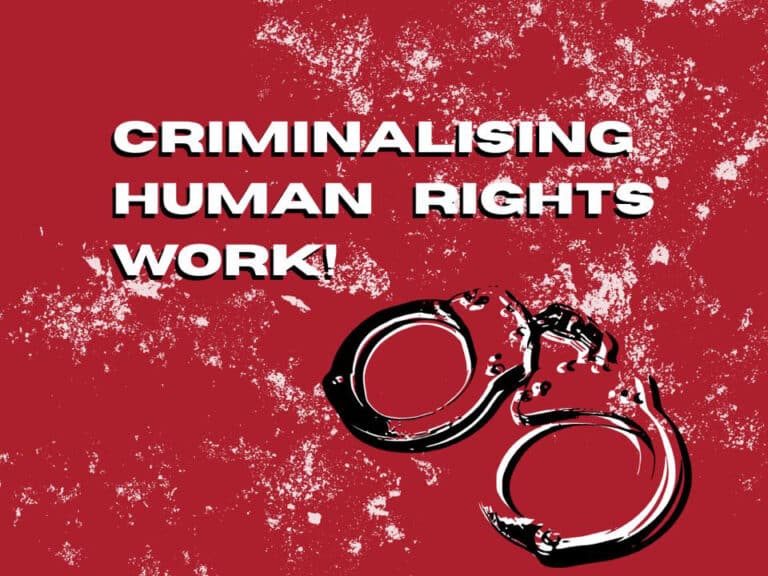Conscientious Objection is a fundamental right as stated in Colombia’s 1991 Constitution (Art. 18). The Constitutional Court recognizes it as such in their Sentence C-728 of 2009.[1] It also mentions the reason why this right is included in the constitutional realm.[2]
The right to Conscientious Objection is ruled in law 1861 of 2017 as a cause for exoneration; art. 12, section N that states: conscientious objector citizens are exempt from serving obligatory military service. Paragraph 1 says this declaration happens in front of an interdisciplinary commission made up of members of the Ministry of Defense and Public Ministry.
This becomes the first obstacle for conscientious objectors: those who make the decisions about their condition and grant access to this right are mostly military members who make up the interdisciplinary commission. The presence of the Public Ministry is minimal and does not guarantee the safeguarding of this fundamental right.
It is important to clarify that even if the right is regulated by law, there is no guarantee that youth can access it, as happens with the right to health or education, for example. The gap between the law and its integral fulfillment is complicated.
An example of the former include violations to the incorporation of due process[3] stated in law 1861 of 2017, where the recruitment department does not fully comply with the norm that rules their actions.
One of the most common breaches of due process is that the army does not inform the youth about conscientious objection as an exemption and how to access this right. This is a preliminary step to joining the ranks: to inform the youth about the exemptions by law (16 total) and provide the necessary information so that, if it applies to their case, they can follow the established procedures and can be recognized as conscientious objectors.
In light of this reality we learned about the case of Andrés[4], a young adult from the city of Medellín who declared conscientious objection in 2020. Andrés was accompanied by a collective of conscientious objectors who advise youth initiating their declaration process. He presented his declaration in written form and also in person at the Fourth Recruitment Zone in Medellín.
In his declaration, Andrés argues, among other things: “I exercise my right to be autonomous, to care for myself, both my physical and mental health, the values instilled in favor of life and my principles; and for these reasons I make the decision of not wanting to carry out military service, since from my perspective ‘no army defends peace’.”
The army’s response said only that before replying to his request he would need to register on the recruitment web page, as if Andrés reporting himself in person were not enough. By giving all his personal information, his written conscientious objector declaration and a right of petition, he was already making that first step of due process.
Even so, the Fourth Recruitment Zone in charge of responding to the request argued that the response was outside their competence, blatantly violating due process and discriminating Andrés for demanding proof of something that was already properly supported. “The elements to be declared as conscientious objector must be motivated, externalized and proved” […][5] Elements that, as we insist, Andrés proved when he came forward to address his military status based on paragraph 4º of art. 17 of the law in question.[6]
The army then responded that: “After that, the matter at hand will be solved through an administrative act, once the regulated process for such cases is followed.” With this lack of response, Andrés decided to act in civil disobedience, stopping the process of recognition of conscientious objection status with the Ministry of Defense, and voluntarily refusing to come forward to define his military status.
As long as there is no guarantee to access the right to conscientious objection many youth decide to drop the process or submit a “tutela” before a judge in hope for more guarantees.
Furthermore, arbitrary detentions for recruitment purposes (batidas) continue to occur; a procedure that, most importantly, constitutes a violation to the right of personal freedom, movement and conscience, as mentioned by the‘ Grupo de Trabajo sobre la Detención Arbitraria’ (Arbitrary Detention Working Group) of the United Nations Human Rights Commission in its OPINION No.8/2008 (Colombia), especially item number 23.[7]
Also, the Constitutional Court has repeatedly made a pronouncement stating the batidas or raids on youth that have not defined their military status are illegal. One of their clearest pronouncements can be found in the resolution section of Sentence T-455/2014.
Keeping clear this constitutional realm, law 1861 of 2017 itself included in its Art. 4, Paragraph 2° the expressed prohibition to perform these arbitrary procedures: “For no reason whatsoever it will be permitted to the public force to perform detentions or surprise operations to capture Colombian citizens who at that point might not have rendered or completed their military service.”
Taking into account all the above, the following is important: first, that all youth have the right to know about all the exemptions by law, and that if their condition is included in any of them they have the right to due process as stated by law. Second, that conscientious objectors be fully recognized without any discrimination.
We are concerned that arbitrary detentions continue to happen currently, a practice that goes against the legal precepts and the constitutional law, as have happened for example in the cities of Cali and Medellín at the beginning of this year. Raids are totally illegal, as expressed by the Arbitrary Detention Working Group before the United Nations: “No case permits arrests, detentions and incorporation to the military against a will expressly declared.”
As Community Peacemaker Teams, with our principles of nonviolence, we support the need to explore alternatives to war, where children and youth, women and men can have and build alternatives to the armed conflict that Colombia experiences. To move away from war and not join it is an ethical precept and a commitment to respect life in all its different expressions.
Finally, we exhort the competent authorities to respect the right to conscientious objection. As CPT, we want to explore spaces to accompany actions and organizations that work to promote conscientious objection; spaces that offer information, outreach and accompaniment to conscientious objector youth.




